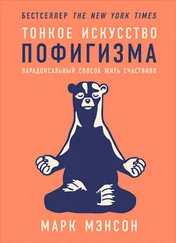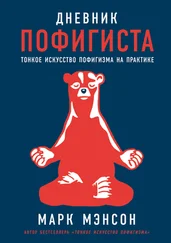Марк Мэнсон - The Subtle Art of Not Giving a F*ck
Здесь есть возможность читать онлайн «Марк Мэнсон - The Subtle Art of Not Giving a F*ck» весь текст электронной книги совершенно бесплатно (целиком полную версию без сокращений). В некоторых случаях можно слушать аудио, скачать через торрент в формате fb2 и присутствует краткое содержание. Год выпуска: 2016, Издательство: HarperCollins, Жанр: Самосовершенствование, на английском языке. Описание произведения, (предисловие) а так же отзывы посетителей доступны на портале библиотеки ЛибКат.
- Название:The Subtle Art of Not Giving a F*ck
- Автор:
- Издательство:HarperCollins
- Жанр:
- Год:2016
- ISBN:нет данных
- Рейтинг книги:5 / 5. Голосов: 2
-
Избранное:Добавить в избранное
- Отзывы:
-
Ваша оценка:
- 100
- 1
- 2
- 3
- 4
- 5
The Subtle Art of Not Giving a F*ck: краткое содержание, описание и аннотация
Предлагаем к чтению аннотацию, описание, краткое содержание или предисловие (зависит от того, что написал сам автор книги «The Subtle Art of Not Giving a F*ck»). Если вы не нашли необходимую информацию о книге — напишите в комментариях, мы постараемся отыскать её.
The Subtle Art of Not Giving a F*ck — читать онлайн бесплатно полную книгу (весь текст) целиком
Ниже представлен текст книги, разбитый по страницам. Система сохранения места последней прочитанной страницы, позволяет с удобством читать онлайн бесплатно книгу «The Subtle Art of Not Giving a F*ck», без необходимости каждый раз заново искать на чём Вы остановились. Поставьте закладку, и сможете в любой момент перейти на страницу, на которой закончили чтение.
Интервал:
Закладка:
This premise, though, is the problem. Happiness is not a solvable equation. Dissatisfaction and unease are inherent parts of human nature and, as we’ll see, necessary components to creating consistent happiness. The Buddha argued this from a theological and philosophical perspective. I will make the same argument in this chapter, but I will make it from a biological perspective, and with pandas.
The Misadventures of Disappointment Panda
If I could invent a superhero, I would invent one called Disappointment Panda. He’d wear a cheesy eye mask and a shirt (with a giant capital T on it) that was way too small for his big panda belly, and his superpower would be to tell people harsh truths about themselves that they needed to hear but didn’t want to accept.
He would go door-to-door like a Bible salesman and ring doorbells and say things like, “Sure, making a lot of money makes you feel good, but it won’t make your kids love you,” or “If you have to ask yourself if you trust your wife, then you probably don’t,” or “What you consider ‘friendship’ is really just your constant attempts to impress people.” Then he’d tell the homeowner to have a nice day and saunter on down to the next house.
It would be awesome. And sick. And sad. And uplifting. And necessary. After all, the greatest truths in life are usually the most unpleasant to hear.
Disappointment Panda would be the hero that none of us would want but all of us would need. He’d be the proverbial vegetables to our mental diet of junk food. He’d make our lives better despite making us feel worse. He’d make us stronger by tearing us down, brighten our future by showing us the darkness. Listening to him would be like watching a movie where the hero dies in the end: you love it even more despite making you feel horrible, because it feels real.
So while we’re here, allow me to put on my Disappointment Panda mask and drop another unpleasant truth on you:
We suffer for the simple reason that suffering is biologically useful. It is nature’s preferred agent for inspiring change. We have evolved to always live with a certain degree of dissatisfaction and insecurity, because it’s the mildly dissatisfied and insecure creature that’s going to do the most work to innovate and survive. We are wired to become dissatisfied with whatever we have and satisfied by only what we do not have. This constant dissatisfaction has kept our species fighting and striving, building and conquering. So no—our own pain and misery aren’t a bug of human evolution; they’re a feature.
Pain, in all of its forms, is our body’s most effective means of spurring action. Take something as simple as stubbing your toe. If you’re like me, when you stub your toe you scream enough four-letter words to make Pope Francis cry. You also probably blame some poor inanimate object for your suffering. “Stupid table,” you say. Or maybe you even go so far as to question your entire interior design philosophy based on your throbbing foot: “What kind of idiot puts a table there anyway? Seriously?”
But I digress. That horrible stubbed-toe-induced pain, the one you and I and the pope hate so much, exists for an important reason. Physical pain is a product of our nervous system, a feedback mechanism to give us a sense of our own physical proportions—where we can and cannot move and what we can and cannot touch. When we exceed those limits, our nervous system duly punishes us to make sure that we pay attention and never do it again.
And this pain, as much as we hate it, is useful. Pain is what teaches us what to pay attention to when we’re young or careless. It helps show us what’s good for us versus what’s bad for us. It helps us understand and adhere to our own limitations. It teaches us to not fuck around near hot stoves or stick metal objects into electrical sockets. Therefore, it’s not always beneficial to avoid pain and seek pleasure, since pain can, at times, be life-or-death important to our well-being.
But pain is not merely physical. As anyone who has had to sit through the first Star Wars prequel can tell you, we humans are capable of experiencing acute psychological pain as well. In fact, research has found that our brains don’t register much difference between physical pain and psychological pain. So when I tell you that my first girlfriend cheating on me and leaving me felt like having an ice pick slowly inserted into the center of my heart, that’s because, well, it hurt so much I might as well have had an ice pick slowly inserted into the center of my heart.
Like physical pain, our psychological pain is an indication of something out of equilibrium, some limitation that has been exceeded. And like our physical pain, our psychological pain is not necessarily always bad or even undesirable. In some cases, experiencing emotional or psychological pain can be healthy or necessary. Just like stubbing our toe teaches us to walk into fewer tables, the emotional pain of rejection or failure teaches us how to avoid making the same mistakes in the future.
And this is what’s so dangerous about a society that coddles itself more and more from the inevitable discomforts of life: we lose the benefits of experiencing healthy doses of pain, a loss that disconnects us from the reality of the world around us.
You may salivate at the thought of a problem-free life full of everlasting happiness and eternal compassion, but back here on earth the problems never cease. Seriously, problems don’t end. Disappointment Panda just dropped by. We had margaritas, and he told me all about it: problems never fucking go away, he said—they just improve. Warren Buffett’s got money problems; the drunk hobo down at Kwik-E Mart’s got money problems. Buffett’s just got better money problems than the hobo. All of life is like this.
“Life is essentially an endless series of problems, Mark,” the panda told me. He sipped his drink and adjusted the little pink umbrella. “The solution to one problem is merely the creation of the next one.”
A moment passed, and then I wondered where the fuck the talking panda came from. And while we’re at it, who made these margaritas?
“Don’t hope for a life without problems,” the panda said. “There’s no such thing. Instead, hope for a life full of good problems.”
And with that, he set his glass down, adjusted his sombrero, and sauntered off into the sunset.
Happiness Comes from Solving Problems
Problems are a constant in life. When you solve your health problem by buying a gym membership, you create new problems, like having to get up early to get to the gym on time, sweating like a meth-head for thirty minutes on an elliptical, and then getting showered and changed for work so you don’t stink up the whole office. When you solve your problem of not spending enough time with your partner by designating Wednesday night “date night,” you generate new problems, such as figuring out what to do every Wednesday that you both won’t hate, making sure you have enough money for nice dinners, rediscovering the chemistry and spark you two feel you’ve lost, and unraveling the logistics of fucking in a small bathtub filled with too many bubbles.
Problems never stop; they merely get exchanged and/or upgraded.
Happiness comes from solving problems. The keyword here is “solving.” If you’re avoiding your problems or feel like you don’t have any problems, then you’re going to make yourself miserable. If you feel like you have problems that you can’t solve, you will likewise make yourself miserable. The secret sauce is in the solving of the problems, not in not having problems in the first place.
To be happy we need something to solve. Happiness is therefore a form of action; it’s an activity, not something that is passively bestowed upon you, not something that you magically discover in a top-ten article on the Huffington Post or from any specific guru or teacher. It doesn’t magically appear when you finally make enough money to add on that extra room to the house. You don’t find it waiting for you in a place, an idea, a job—or even a book, for that matter.
Читать дальшеИнтервал:
Закладка:
Похожие книги на «The Subtle Art of Not Giving a F*ck»
Представляем Вашему вниманию похожие книги на «The Subtle Art of Not Giving a F*ck» списком для выбора. Мы отобрали схожую по названию и смыслу литературу в надежде предоставить читателям больше вариантов отыскать новые, интересные, ещё непрочитанные произведения.
Обсуждение, отзывы о книге «The Subtle Art of Not Giving a F*ck» и просто собственные мнения читателей. Оставьте ваши комментарии, напишите, что Вы думаете о произведении, его смысле или главных героях. Укажите что конкретно понравилось, а что нет, и почему Вы так считаете.












